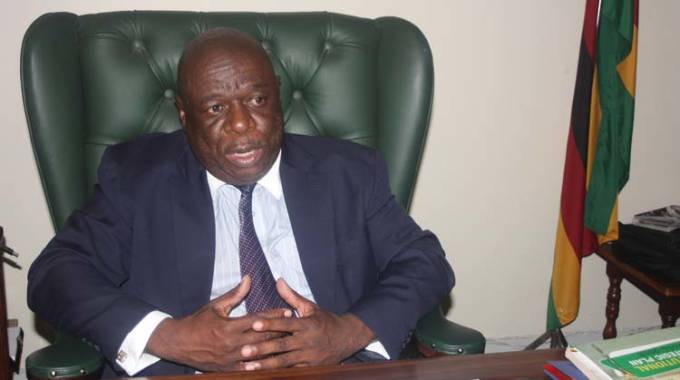Source: ‘CDF boon for development’ | The Sunday Mail
Last week, 28 legislators who won in the recently held by-elections were sworn-in when Parliament resumed sitting following a two-week break. They took their oaths of affirmation to the Constitution and laws of the country before Clerk of Parliament Mr Kennedy Chokuda. Swearing in of the legislators also coincided with the completion of work on the new Parliament building in Mt Hampden. The Sunday Mail’s Wallace Ruzvidzo (WR) spoke to Mr Chokuda (KC) on the recent developments in the House and plans for relocating Parliament to the new building.
*******************
WR: The recently elected legislators will serve for around one year. Are they entitled to all the benefits due to our Parliamentarians such as new vehicles and the disbursements from the Constituency Development Fund (CDF)?
KC: There are benefits that are due to Members of Parliament and these will be extended to new members as well.
This will include the CDF for 2022 and 2023. In respect of vehicles this will be treated on a case-by-case basis depending on the status of the member.
The new members will get a vehicle as expected.
Those returning to Parliament and who had received a vehicle during the life of this Parliament have already been covered and hence will not get a new vehicle.
The law says a member is only eligible for one vehicle every five years.
However, if a member was recalled before they received a vehicle they will still be eligible to receive a vehicle.
WR: When do you expect to move into the new Parliament building, which is now complete and what will happen to the old Parliament building?
KC: We expect to move to the new Parliament during the first half of the year.
The use of the current building will be decided on by the Government of Zimbabwe.
WR: Can you outline the level of uptake of the Constituency Development Fund (CDF) by legislators and if there are any notable developments that have accrued from this Fund during the life of the current Parliament?
KC: The uptake of CDF by Members of Parliament has been very good, especially in 2021.
More than 80 percent of the members did access the CDF.
There have been many impactful and exemplary CDF projects around the country and across the political divide.
Examples include the completion of several clinics, classroom blocks, solar-powered boreholes, and dams in some constituencies.
WR: In his last State of the Nation Address, President Mnangagwa raised concern about the slow pace of passing new legislation. What are you doing to address this concern?
KC: All Portfolio Committees have been instructed to engage with the respective Ministries to ensure that all the Bills that were outlined in the State of the Nation Address are brought to Parliament timeously.
WR: You have, in the past, spoken about the establishment of a Parliament television station. Can you outline the progress Parliament has made with regards to the establishment of the television station?
KC: Plans to establish a Parliament TV are still very much alive.
As you will recall, Government promised Parliament a channel once the digitalisation process of the airwaves has been completed.
However, we have not sat on our laurels and we have a comprehensive concept note detailing the equipment, human and financial resources required to set up a TV channel.
While the resource requirements are substantial, we believe this can be achieved in a modular and phased approach.
What we may be able to set up in the short term is a Parliament radio, as our counterparts in Zambia have done, as the resources required are substantially lower.
The new Parliament building already has provision for a television studio and we are engaging with the relevant authorities on the matter.
Already as a Parliament, we have undertaken steps to increase coverage of Parliament activities by the national and other broadcasters.
This includes both plenary sittings, committee meetings, public hearings, and field visits.
We have also embraced social media platforms and a lot of Parliamentary activities are being covered through Facebook Live and YouTube. WR: Can you outline how Parliament has been operating under Covid-19 and the challenges you have faced as a result of the pandemic?
KC: Parliament has successfully managed to cope with the Covid-19 outbreak through our business continuity preparedness.
The investments we made in ICTs before the outbreak enabled the business of Parliament to continue with minimal disruptions.
First, we had to amend our Standing Rules and Orders to provide for virtual sittings and meetings.
Just as an example, during the pandemic we managed to have virtual Official Opening and State of the Nation Addresses to Parliament in 2020 and 2021 and pass the 2022 National Budget through a hybrid sitting of Parliament.
We have also provided Members of Parliament and staff with the appropriate tools of the trade to enable them to work remotely.
We also created social media platforms to enable the public to make contributions to Parliament processes and also through conducting live radio public hearings.
In addition, we have also installed two toll-free lines to enable the public to call Parliament at no cost to them.
The two toll-free lines are 0781825124 (Econet) and 08014419 (NetOne) and we urge members of the public to make use of these lines.
The challenges that we have faced relate to the cost of data to enable Members of Parliament and the public to use virtual platforms.
Related to this is the issue of poor or limited connectivity thus affecting the ability of some Zimbabweans to participate in the work of Parliament. The digital divide also means that there is a segment of our society that is left behind when we use virtual platforms and hence committees of Parliament have had to go into the hinterland during public hearings to ensure that no one is left behind.
Newer Post
Tharisa injects more than US$50,5m in Karo Older Post
Govt under fire over medical aid 
COMMENTS